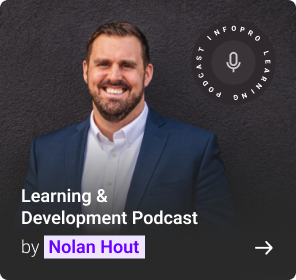The transformation in leadership training and development is evident, propelled by the rise of digital leadership development platforms and the growing importance of diversity and inclusion. This blog explores the top leadership development trends to look for in 2024, shedding light on the strategies and approaches that will empower leaders to thrive in the fast-paced, ever-changing business environment.
Let’s look at some of the leading leadership development trends you should look for in 2024.
Connecting People to Purpose
Exceptional team performance is driven by leaders who combine the execution of tasks with thoughtful mentoring and coaching of their employees. People who find purpose in their work tend to produce better results and show higher satisfaction rates.
An employee’s sense of purpose and satisfaction essentially stems from three areas:
- Engagement in meaningful project execution (connection to their work)
- The organizational purpose (mission, culture, values, employee experience, etc.)
- Activities outside work (hobbies, relationships, etc.)
Developing an organizational culture where leaders open up a genuine dialogue that can help people connect to their purpose.
Structuring Talent Management Around Skills, Not Roles
The business landscape is evolving rapidly, leading to significant changes in job roles. According to the LinkedIn Workplace Learning Report 2023, job skill sets have evolved by about 25% since 2015, which is anticipated to double by 2027. With evolving job requirements, organizations must adapt and focus on adopting a skills-centric approach toward talent management.
For emerging leaders, navigating this dynamic landscape is crucial. Creating a more adaptable workforce to cover skills gaps is imperative. Hence, organizations must shift their focus from rigid role-based structures to a more flexible approach centered around cultivating and leveraging essential skills within their workforce. This strategic shift ensures that talent management aligns with the dynamic needs of the evolving business environment.
Focus on Employee Experience
The quality of your employees’ experiences impacts the success of your organization in more ways than you can imagine. Especially in the post-pandemic scenario where organizations manage hybrid and remote workforces, the importance of exceptional employee experiences increases tenfold. A satisfied, happy, and motivated workforce is the ultimate driver of the success of an organization.
Leaders must clearly define their organization’s vision and the roles they expect their employees to play in bringing that vision to fruition. This drives exceptional employee experiences. In 2024, employee experience will be more important than ever.
Career Pathing
Career pathing is a trend that organizations should consider seriously. It is a significant contributor to the success of an organization. It improves employee retention and motivates them to approach their jobs more diligently.
Career pathing requires leaders to possess the ability to offer unique and personalized opportunities to employees that positively impact the organization.
Engaging with Next-Gen Leaders
Young leaders believe in building an inclusive workplace where every employee grows and thrives in a diverse environment. Next-gen leaders are more diverse, more critical of their work, and tend to desire better equity and inclusion.
To attract and retain next-gen leaders, organizations must focus on flexibility. The organizations must provide more growth opportunities, create a culture of inclusion, and provide high-quality learning & development experiences.
Well-Defined Succession Strategy
A robust succession plan is essential for effective leadership in 2024. Today’s leaders recognize the importance of seeking input and learning from others to enhance personal growth and development. They understand that more than relying solely on their abilities is required. These leaders also acknowledge that there will come a time when someone else can perform certain tasks or responsibilities more effectively than themselves.
Embracing power-sharing becomes a priority, as it benefits the entire organization and so the leaders themselves. Instead of surrounding themselves with yes-men, successful leaders will assemble teams comprising individuals who are unafraid to question, offer alternative perspectives, provide valuable feedback, and contribute innovative solutions. This approach fosters an environment of collaboration and drives continued success.
Conclusion
Leadership development trends evolve as the business environment changes. Paying attention to the upcoming leadership development trends for 2024 can drive your business operations in the right direction. Connecting people to purpose, structuring talent management around skills, prioritizing employee experience, emphasizing career pathing, engaging with next-gen leaders, and implementing a well-defined succession strategy are all key elements for success.
By embracing these trends, leaders can cultivate exceptional team performance, create adaptable workforces, drive employee satisfaction, foster growth and inclusivity, and ensure a smooth leadership transition.


